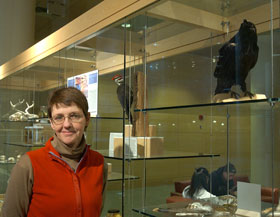  |
| HOME | THIS ISSUE | CALENDAR | GRANTS | BACK ISSUES | < BACK | NEXT > |
Explaining nuances of science no easy taskby Cindy Weiss - February 13, 2006
|
||||
|
As the Connecticut state ornithologist, Margaret Rubega often talks to the public and the press about birds and the environment. Like a lot of scientists, she has felt uncomfortable explaining the nuances of scientific issues in simple, “sound bite” language. “Especially when I was dealing with the media, I felt a little bit like I was on a train with no brakes,” says Rubega, an assistant professor of ecology and evolutionary biology in the College of Liberal Arts and Sciences. During the past year, however, she has learned a skill that some Ph.D. scientists never acquire – how to communicate clearly about complex scientific issues in language that is easily understood by non-scientists. Rubega won a prestigious Aldo Leopold Leadership Fellowship, which trains academic environmental scientists during two intensive week-long sessions to talk to the public about science in order to better inform policy debates. “The gulf between scientists and the average American is looking pretty wide,” Rubega says. With issues such as intelligent design and global warming being debated, it’s to the public’s benefit to understand science better, she notes. “Most scientists read the papers and are amazed at how much the public doesn’t understand about these things,” she says. The public, on the other hand, may not understand how difficult it can be for scientists to avoid the jargon that makes their explanation more precise, or to qualify their statements with disclaimers about the limits of what they know. A simple question, she says, such as, “Do birds know how to get to South America without landmarks?” could elicit a lengthy technical explanation accompanied by a long list of what is known and not known. Or, it could be answered correctly and more simply, “Some do it by following other birds or following the stars.” To the general public, the disclaimers can be confusing and a distraction. “It’s the qualifications that are problematic,” Rubega says. “Yet it’s painful for scientists not to do that. You get trained that way. The uncertainty in our data is as important as the things we know.” Science has become more specialized and controlled by tight professional circles since World War II, she notes. Learning to become a scientist is “in many ways a monk-like existence,” requiring a long period of training and talking to similarly-trained colleagues. One of the hardest things she learned, in a boot camp-like session with national science reporters, was to boil down her answers to reporters. A session leader taught this by summarizing the Lord of the Rings trilogy in five words: “Small people defeat great evil.”
New York Times, Associated Press, and National Public Radio science reporters and editors conducted mock interviews with the science fellows on controversial topics, videotaping and critiquing their answers. The fellows learned to give the bottom line first, rather than starting with the background and describing the results last, the typical pattern of a scientific paper. “I was truly shocked at how little background in science most reporters who report on science have,” Rubega says. They may have to produce a story in three hours, and they don’t have time to do extensive background research. More newspapers print horoscopes than hire science reporters, she learned. Lawmakers, the fellows were told, are not interested in the “gee whiz” of scientific findings, but look for practical answers. The Leopold Fellows practiced testifying at mock hearings conducted by U.S. Senate science committee staffers. They learned to expect that the “senators” might take phone calls, talk to staff members, or get up and leave during testimony. Far from discouraging her, the training gave Rubega confidence in handling press queries and a commitment to share what she learned. Last fall, she taught a seminar for biology graduate students on writing for the non-scientific audience, and her students tried their hand at writing op-ed articles about science policy issues. The Leopold Fellowship taught her to embrace the challenge of breaking away from “techno-babble.” “I certainly agree wholeheartedly with the mission of the program – to get scientists in a position where they can communicate with non-scientists about what they know,” she says. “Arguably, we are worse at it now than we ever have been.” |
| ADVANCE HOME UCONN HOME |

